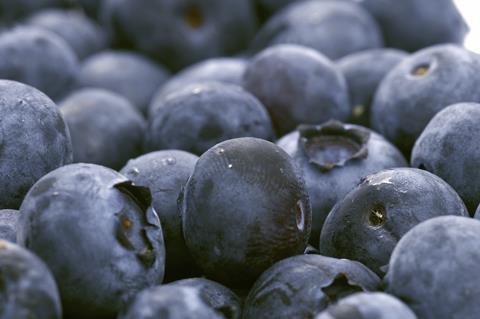
When Brexit shocked the pollsters back in June, it must have been a worrying and uncertain time for Polish exporters. Questions around prices, demand for produce, border controls and tariffs were playing on producers’ minds.
Five months later, the true impact of Brexit remains unclear. Yes, the falling value of the pound has pushed up export prices, but we still don’t know whether the UK will remain in the single market and the impact that Britain’s European exit will have on border controls and phytosanitary inspections remains unclear.
Dominika Kozarzewska, president of Polish blueberry producer Polskie Jagody, has yet to feel the full effects of Brexit and has not been forced to reduce export volumes to the UK. But she anticipates difficulties ahead. “The impact of Brexit may be more pronounced next year, due to exchange rate fluctuations, and even more so when Britain initiates tighter border and phytosanitary inspections,” she says. “This will take time and effort and make exporting produce much more difficult.”
The company, which is a member of the Polish Berry Cooperative, was forced to raise the price of its blueberries to a “similar or slightly higher level” this year, according to Kozarzewska. Another Polish blueberry exporter, Blue River, has also seen little change in the price it can command for its produce in Britain. The unfavourable exchange rate cancelled out a spike in selling prices due to limited supply.
A mild December followed by a severe spring frost reduced yields this year, and although selling prices rose by 20 per cent as a result, all of this price growth was written off by the currency exchange. “There’s a natural hedge with some of our inputs that we buy in sterling, but we always have to change some currency to Polish zloty. This means we are exposed to currency fluctuation,” explains the firm’s managing director and agronomist Neil Simmonds.
Simmonds, who supplies a range of British retailers through Berry Gardens, is optimistic about the future of Poland’s blueberry trade with the UK, saying the fundamentals are in place to ensure a “strong, longlasting relationship”. But he has not ruled out the possibility of searching for new markets if the exchange rates worsen following a slight resurgence of the pound, as a result of this month’s High Court ruling on Article 50.
“If the pound starts to get close to parity with the euro, then we have to keep an open mind about where we trade our berries,” he said. “We’re not a fickle grower and we believe in strong relationships between good times and bad, but we’re always looking to develop new markets and go where there is higher value. We’re open-minded.”
Simmonds highlights the Far East as a potential destination for Polish blueberries in the future, mentioning Hong Kong and Malaysia as potential targets. Ever optimistic, he is hopeful that worsening exchange rates in Europe could provide the stimulus the Polish industry needs to break into new markets further afield.
Polskie Jagody, meanwhile, has already begun to sell fruit in Hong Kong, having also been present in South East Asia for some time. The company sees expanding opportunities in these markets due to the growth of the middle class in Asia’s large cities. But Kozarzewska insists that the British market, in many ways, is more conducive to trade. Polskie Jagody’s exports to the UK more than doubled between 2013 and 2015.
“The UK market remains very important to us,” she says. “The UK has excellent PR marketing for soft fruit in general, and people are very aware of the health benefits of blueberries.” She also mentions the UK’s geographic proximity to Poland as a major benefit compared to markets outside of Europe.
“Because of the distance, the quality requirements for Asia are even more stringent than for the British market,” she says. “You cannot control the temperature on a plane as well as you can on a track and shipping takes much longer, carrying a number of risks.”
But Kozarzewska recognises that quality and certification requirements are increasing in the UK too. “I have been trading with British supermarket chains for roughly 10 years and in this time the requirements have got higher and higher,” she says. “A few years ago, some chains would accept berries measuring below 12mm but now 12mm is an absolute minimum and some are requiring 14mm. We are also seeing interest in premium product above 16mm.”
At the same time, restrictions on residues have tightened and many chains are forcing producers to limit residues to 33 or 50 per cent of the maximum residue level (MRL).
“Generally the retailers are becoming more demanding every season,” Kozarzewska says. “In the end, it’s good for consumers but it can also be really demanding on producers.”
Polish producers will be hoping that, as Brexit unfolds, exchange rates and market access offer opportunities rather than restrictions to trade.
Decline in Polish apple exports to the UK
Polish apple exporter Rajpol says its apple sales to the UK have “almost stopped” due to the post-Brexit devaluation of the pound and a 20 per cent increase in the price paid by British importers.
Chief executive Dominik Wozniak adds that year-on-year sales of Polish apples to the UK have fallen due to increasing production in the UK, while Damian Kozlowski of exporter Ewa-Bis says the Russian embargo on food imports continues to cause difficulties for Polish producers – particularly those with lower-quality apples that are well suited to the Russian market.
Total apple production in Poland has been lower than anticipated this year due to difficult growing conditions, with production below four million tonnes despite a forecast of 4.15m tonnes from the World Apple & Pear Association (WAPA). This has pushed up prices, while the expansion of Polish Gala into alternative markets in Asia, Africa and Canada has made less product available to the UK market.



